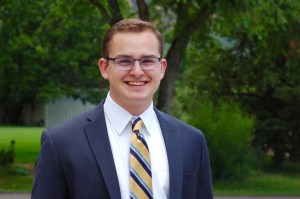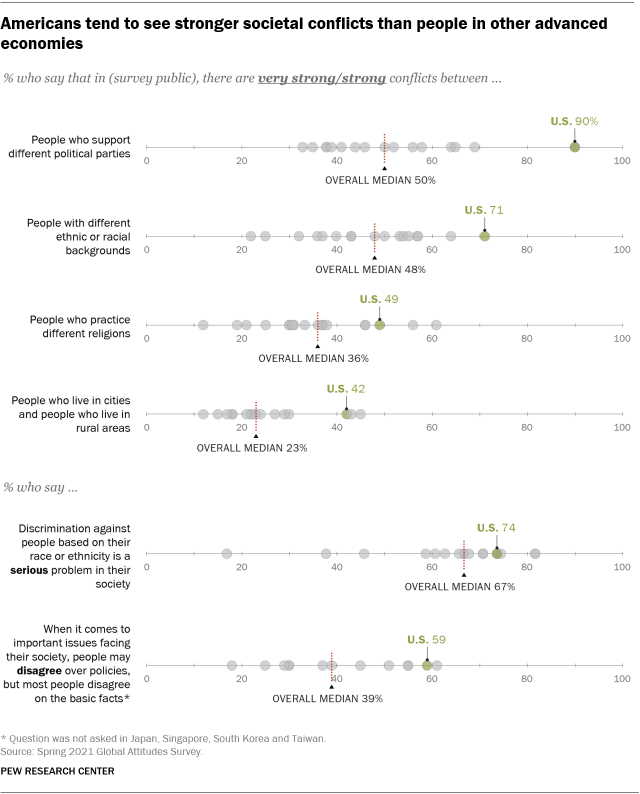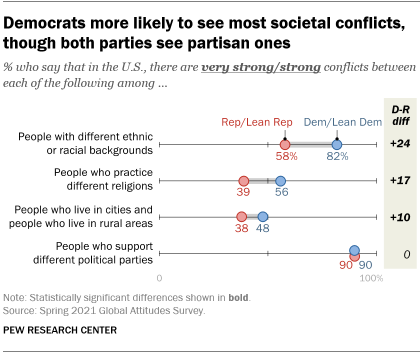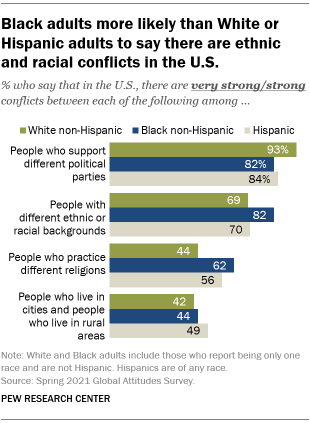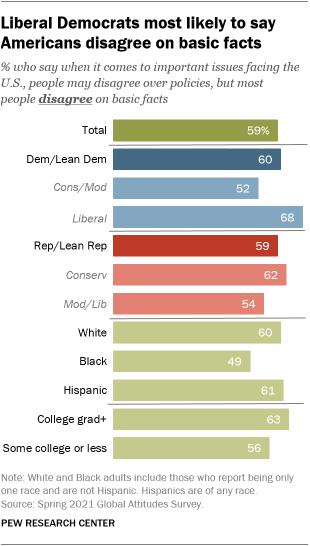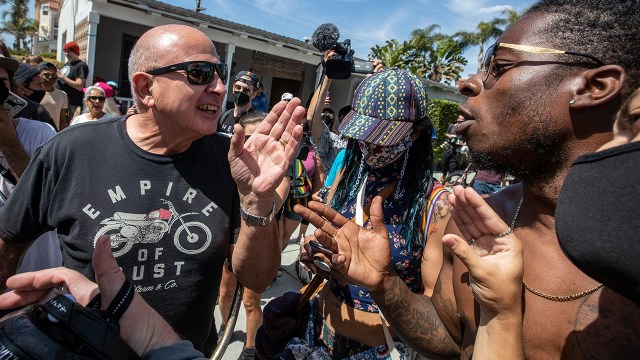
The United States stands out among 17 advanced economies as one of the most conflicted when it comes to questions of social unity. A large majority of Americans say there are strong political and strong racial and ethnic conflicts in the U.S. and that most people disagree on basic facts. And while Americans are not alone in this regard – France and South Korea also stand out as strongly conflicted societies – findings from a new Pew Research Center report reveal exactly how the U.S. is more divided than other societies surveyed.
Nine-in-ten U.S. adults say there are conflicts between people who support different political parties, while an overall median of 50% say the same across all advanced economies surveyed. Similarly, about seven-in-ten Americans say there are conflicts between people with different ethnic or racial backgrounds in the U.S., more than all the other publics surveyed. As a comparison, only about a quarter in Singapore and Taiwan and a third in Spain say the same. On religious and urban-rural conflicts, the U.S. has the third-highest share saying there are conflicts in each case. The only places where a larger share holds these views are France and South Korea.
This Pew Research Center analysis focuses on comparing attitudes in the United States about societal unity with that of views in other advanced economies. For non-U.S. data, this post draws on nationally representative surveys of 16,254 adults from March 12 to May 26, 2021, in 16 advanced economies. All surveys were conducted over the phone with adults in Canada, Belgium, France, Germany, Greece, Italy, the Netherlands, Spain, Sweden, the United Kingdom, Australia, Japan, New Zealand, Singapore, South Korea and Taiwan.
In the U.S., we surveyed 2,596 adults from Feb. 1 to 7, 2021. Everyone who took part in the U.S. survey is a member of the Center’s American Trends Panel (ATP), an online survey panel that is recruited through national, random sampling of residential addresses. This way nearly all adults have a chance of selection. The survey is weighted to be representative of the U.S. adult population by gender, race, ethnicity, partisan affiliation, education and other categories.
This study was conducted in places where nationally representative telephone surveys are feasible. Due to the coronavirus outbreak, face-to-face interviewing is not currently possible in many parts of the world.
Here are the questions used for this analysis, along with responses. Visit our methodology database for more information about the survey methods outside the U.S. For respondents in the U.S., read more about the ATP’s methodology.
Nearly three-quarters of Americans (74%) say that racial and ethnic discrimination is a serious problem in the U.S., compared with a 17-public median of 67% who say racial and ethnic discrimination is a serious problem in their societies. There is wide variation on the item, however, with just 17% in Taiwan saying racial and ethnic discrimination is a serious problem and 82% in France and Italy saying the same.
And the U.S. ranks near the top when it comes to whether people agree on basic facts: A majority of Americans (59%) say people can’t agree on basic facts, second only to France (61%).
In the U.S., there are large political divisions on most of the measures of societal conflict. Democrats and Democratic-leaning independents are significantly more likely than Republicans and Republican-leaning independents to say there are conflicts on each of the items surveyed, with one exception: An equal share (90%) of partisans on both sides say there are strong or very strong conflicts between people who support different political parties. Previous findings in the U.S. showed that about equally large shares of Americans said conflicts between Democrats and Republicans were strong or very strong. Democrats are also significantly more likely than Republicans to say racial and ethnic discrimination is a serious problem in the U.S., in line with long-standing findings that show wide partisan divisions on racial and ethnic inequality.
There are also significant differences on questions of societal conflict when it comes to racial and ethnic identity in the U.S. White non-Hispanic adults are significantly more likely than Black non-Hispanic or Hispanic adults to say there are conflicts between people who support different political parties, though large majorities of all three groups hold this opinion. When it comes to conflict between people with different racial and ethnic backgrounds, 82% of Black Americans say there are very strong or strong conflicts, compared with around seven-in-ten White and Hispanic Americans. Black and Hispanic adults are significantly more likely than White adults to say there are conflicts between people who practice different religions.
Partisans in the U.S. are roughly equally likely to say that Americans disagree about basic facts. Six-in-ten Democrats share this view, as do about six-in-ten Republicans. But liberal Democrats (68%) are significantly more likely than moderate and conservative Democrats (52%) to say most Americans disagree on basic facts. Among conservative Republicans, 62% say most people disagree on basic facts, while 54% of moderate and liberal Republicans say so.
About six-in-ten White non-Hispanic and Hispanic adults say when it comes to important issues facing the U.S., most people disagree on basic facts. Black non-Hispanic adults are significantly less likely to hold this view than White or Hispanic adults, with 49% saying most people disagree on basic facts. Those with a college degree or more education are also significantly more likely to say people disagree on basic facts than those with some college or less (63% and 56%, respectively).
Note: Here are the questions used for this analysis, along with responses. Visit our methodology database for more information about the survey methods outside the U.S. For respondents in the U.S., read more about the ATP’s methodology.
